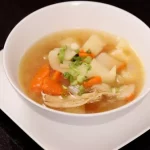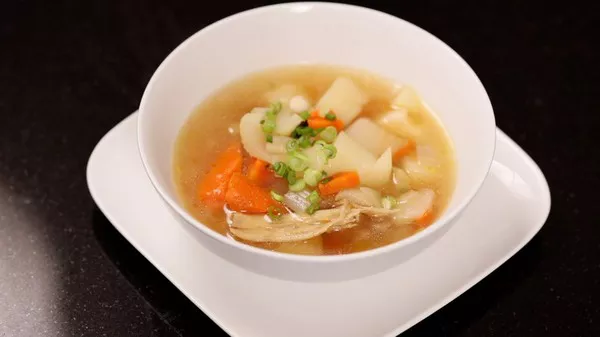Chinese cuisine is renowned for its intricate flavors, vibrant colors, and holistic approach to health and wellness. One of the shining examples of this culinary philosophy is the Chinese Chicken Herbal Soup. This age-old recipe not only tantalizes taste buds but also promotes well-being through the harmonious combination of ingredients that are believed to offer various health benefits. In this article, we delve into the rich history, nutritional value, and step-by-step preparation of this traditional delicacy.
History of Chinese Chicken Herbal Soup
The tradition of Chinese herbal soups dates back thousands of years, rooted in the philosophy of balancing Yin and Yang energies in the body for optimal health. The use of herbs and natural ingredients in soups is deeply embedded in Chinese culture, with recipes passed down through generations. These soups were often tailored to address specific health concerns and provide nourishment to individuals at different life stages.
The Nutritional Value of Chinese Chicken Herbal Soup
Chinese Chicken Herbal Soup stands out not only for its distinctive flavor but also for its potential health benefits. The soup typically combines a variety of herbs, roots, and other natural ingredients with chicken to create a nourishing and flavorful dish. Some common ingredients used in Chinese herbal soups include:
1. Chinese Herbs: Traditional Chinese medicine emphasizes the use of specific herbs with unique properties. These herbs can include goji berries, red dates, astragalus root, and dried longan, each bringing its own set of nutritional benefits to the table.
2. Chicken: Chicken serves as the protein base for the soup. It provides essential amino acids, vitamins, and minerals that support overall health and well-being.
3. Root Vegetables: Ingredients like ginger and ginseng are often used for their potential immune-boosting properties and ability to enhance digestion.
4. Fruits: Fruits like red dates and dried longan add natural sweetness to the soup while providing antioxidants and nutrients.
5. Mushrooms: Varieties like shiitake or wood ear mushrooms can contribute a rich umami flavor and valuable nutrients.
Chinese Chicken Herbal Soup

Chinese Chicken Herbal Soup is a timeless dish that captures the essence of Chinese culinary tradition and holistic wellness. This aromatic and flavorful soup combines tender chicken with an array of nourishing herbs and ingredients, resulting in a harmonious blend of taste and health benefits.
- large pot
- 1 whole chicken (preferably free-range)
- A handful of Chinese herbs ((e.g., goji berries, dried red dates, dried longan))
- 2-3 slices ginger
- 2-3 slices astragalus root
- 2-3 slices ginseng (optional)
- 3-4 dried shiitake mushrooms
- 1 small carrot (sliced)
- Salt and pepper to taste
- Water
-
Prepare the Herbs: Rinse the Chinese herbs and dried ingredients (like red dates and dried longan) to remove any impurities.
-
Clean the Chicken: Clean the chicken thoroughly, removing excess fat and any internal organs. Blanch the chicken in boiling water for a few minutes to remove any residual blood and impurities. Rinse it under cold water.
-
Start Cooking: Fill a large pot with water (about 10 cups) and bring it to a boil. Add the blanched chicken, ginger, astragalus root, and ginseng slices if using. Reduce the heat to a simmer.
-
Add Herbs and Ingredients: After the chicken has been simmering for about 30 minutes, add the rinsed Chinese herbs, dried shiitake mushrooms, dried fruits, and carrot slices.
-
Simmer: Let the soup simmer on low heat for an additional 1.5 to 2 hours. Skim off any impurities or foam that may rise to the surface during cooking.
-
Season to Taste: Add salt and pepper to taste. Remember that the herbs and ingredients contribute their own flavors, so be mindful of the seasoning.
Serve and Enjoy Chinese Chicken Herbal Soup:
Once the Chinese Chicken Herbal Soup is ready, carefully remove the chicken and strain the soup to separate the liquid from the solid ingredients.
Ladle the fragrant soup into bowls, ensuring that each serving contains a generous portion of tender chicken, nourishing herbs, and aromatic broth.
Serve the soup hot and savor the wholesome goodness that you’ve created.
Health Benefits of Chinese Chicken Herbal Soup
Chinese Chicken Herbal Soup is revered not only for its delightful taste but also for the potential health benefits attributed to its ingredients. Some of these benefits include:
1. Immune System Support: Many of the herbs and ingredients used in the soup are believed to have immune-boosting properties, aiding the body’s defense mechanisms against illnesses.
2. Digestive Health: Ginger and other digestive aids can contribute to improved digestion and gut health.
3. Energy and Vitality: The combination of chicken and nourishing herbs can provide a source of sustained energy and vitality.
4. Stress Relief: Certain herbs and ingredients may have adaptogenic properties that help the body cope with stress and maintain balance.
5. Blood Circulation: Ingredients like red dates are thought to support blood circulation and heart health.
Variations and Adaptations of Chinese Chicken Herbal Soup
Certainly! Chinese Chicken Herbal Soup is a versatile dish, and there are various ways to adapt and customize it to suit your preferences and dietary needs. Here are some variations and adaptations you can consider:
1. Vegetarian/Vegan Herbal Soup: For a vegetarian or vegan version, you can replace the chicken with tofu, seitan, or plant-based protein. Use vegetable broth instead of chicken broth and focus on using herbs and ingredients that align with your dietary choices.
2. Seafood Herbal Soup: Instead of chicken, you can use seafood like fish or shrimp to create a flavorful seafood herbal soup. The herbs can be adjusted to complement the seafood flavors.
3. Mushroom Herbal Soup: Create a rich and earthy version by using a variety of mushrooms, such as shiitake, oyster, and reishi. These mushrooms add depth and umami to the soup.
4. Clear Herbal Broth: If you prefer a lighter version, you can skip using meat and create a clear herbal broth using a combination of herbs and vegetables. This can be a great option for those looking for a cleansing and detoxifying soup.
5. Customized Herbal Blend: Feel free to experiment with different herbs based on your preferences and health goals. Some commonly used herbs include astragalus, goji berries, red dates, dried longan, and ginseng. You can adjust the quantities and types of herbs to create a blend that suits your taste.
6. Instant Pot or Pressure Cooker Version: If you’re short on time, you can adapt the recipe for an Instant Pot or pressure cooker. This can significantly reduce the cooking time while still infusing the flavors of the herbs into the soup.
7. Noodle or Rice Addition: Turn the herbal soup into a more substantial meal by adding noodles (such as wheat noodles or rice noodles) or rice. This adds texture and makes the soup more filling.
8. Spices and Aromatics: While Chinese herbal soups traditionally use specific herbs, you can enhance the flavor by adding spices like ginger, garlic, and star anise. These aromatics can complement the herbal flavors and add complexity to the broth.
Are there any precautions I should take when using Chinese herbs?
1. Consult a Professional: It’s recommended to consult a qualified herbalist, Traditional Chinese Medicine (TCM) practitioner, or healthcare professional before incorporating Chinese herbs into your diet or health regimen. They can help you choose the right herbs based on your specific needs and health conditions.
2. Individual Sensitivities: Just like with any medication or natural remedy, individuals can react differently to Chinese herbs. Some herbs might cause allergic reactions, digestive issues, or other adverse effects in some people. Start with a small amount and observe how your body responds.
3. Quality and Source: Ensure that you’re sourcing your Chinese herbs from reputable suppliers to ensure their authenticity, quality, and safety. Contaminated or poor-quality herbs can have negative effects on health.
4. Herb-Drug Interactions: Chinese herbs can interact with prescription medications, over-the-counter drugs, and other supplements. Certain herbs might enhance or interfere with the effects of medications. Inform your healthcare provider about any herbs you’re using to avoid potential interactions.
5. Pregnancy and Breastfeeding: Pregnant and breastfeeding individuals should exercise extra caution when using Chinese herbs. Some herbs can have contraindications during pregnancy and might affect the developing fetus or nursing infant. Always consult a healthcare provider before using herbs during these periods.
6. Dosage: Follow recommended dosages and guidelines provided by a knowledgeable practitioner. Taking too much of an herb can lead to adverse effects or complications.
7. Duration of Use: Chinese herbs are often prescribed in specific courses or for certain durations. Long-term or excessive use of certain herbs could have unintended effects or contribute to imbalances.
8. Known Medical Conditions: If you have pre-existing health conditions, such as liver or kidney issues, cardiovascular problems, or hormone-related disorders, some Chinese herbs might not be suitable for you. Discuss your medical history with a professional before using herbs.
How should I store leftover soup?
1. Cooling Down: Before storing, allow the leftover soup to cool down to room temperature. This helps prevent the development of bacteria when the soup is stored in the refrigerator.
2. Divide into Portions: If you have a large batch of leftover soup, consider dividing it into smaller portions. This makes reheating easier and prevents you from having to reheat the entire batch if you only want a portion.
3. Refrigeration: To store the leftover soup in the short term (1-2 days), transfer it into airtight containers or resealable plastic bags. Make sure the containers are clean and dry before adding the soup. Seal the containers tightly to prevent air from getting in and causing the soup to spoil quickly.
4. Labeling and Dating: It’s a good practice to label the containers with the date you cooked the soup. This helps you keep track of how long the soup has been in the refrigerator.
5. Refrigerator Placement: Place the sealed containers of soup in the refrigerator as soon as possible. Store them on a shelf where they won’t be exposed to raw meat or other potentially contaminating foods.
See Also: 5 Healthiest Chinese Soups & Their TCM Perspectives
Conclusion
Chinese Chicken Herbal Soup is a culinary masterpiece that bridges the gap between taste and health. With its rich history and potential wellness benefits, this traditional dish embodies the philosophy of holistic nourishment. Crafting this soup in your own kitchen provides an opportunity to engage with centuries-old traditions while exploring the depths of flavors and textures that Chinese cuisine has to offer. So, why not embark on a culinary journey that not only delights your taste buds but also supports your overall well-being?

